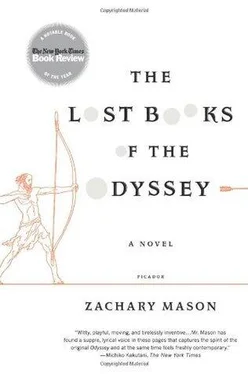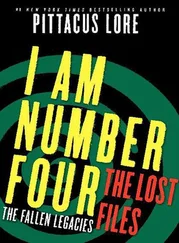“I am a traveler from Troy who has come a long way with Odysseus, your husband,” he said. “What cruel fate befell you that the deep-thinking hero must now return to a cold and empty hall?”
“You lie,” she said apathetically, “Odysseus is no more. When he had been gone ten years and a little more I went to Delphi to learn what had become of him. I gave the priest a silver bowl embossed with sphinxes that had been part of my dowry. He led me down into a cave dark as a womb where it smelled of wet stone and hot metal. I asked the shuddering oracle, whom I heard but could not see, whether Odysseus would come back to me. ‘No man will return to you, but not for a long while,’ she said, and all my hope fell to the floor. *
“Back in Ithaca, many men sought my hand. I told them I would marry when I had finished my husband’s funeral shroud, and I kept weaving it and weaving it. They grew impatient — they pled and reasoned but were working themselves up to violence.
“I wanted to secure my son’s patrimony. So I sent Telemachus off to visit Sparta and when he was gone gave a feast to which I made a point of inviting every man who had courted me. I let it be known that by the end of the feast I would be with the man who would be my husband. The wine was poisoned — painful and slow, but sure. I drank first. And so I made a liar of myself, for though I have searched every vale of the shadowlands I have not found even a rumor of him.”
“Would you know your husband? Do you not recognize me, at all?” asked Odysseus gently.
“Yes, I recognize you. You are the living, come with all your heat and blood to trouble my shadows and dust. Traveler, begone from here.”
“But I must come back once more when my days are done and then, finally, you will be waiting for me,” he said and reached out to touch her cheek but she slipped away like a fish in a stream.
*It was a little more than ten years after leaving Ithaca that Odysseus encountered the cyclops Polyphemus and as a ruse de guerre said his name was Noman.
Since you ask, I will tell you. So drink your wine and take your ease, traveler. The nights are long in Ithaca and tomorrow will look after itself. *
I was born on Limnos, an island far west of here, the last place the sun rises. The farms on Limnos are scattered and the people are taciturn, miserly and dishonest. The king was Tethios, my father, a grim, silent man. Our house was on a white hill on the westernmost point of the island. On the beach the bones of a ruined temple protruded from the sand and I would play among its weathered stones while Nurse watched me.
Nurse was a Phoenician with a face like a blade and a body like an arrow. Now I know that no one would call her desirable but to me she was beautiful. My mother stayed in bed in a darkened room and my father had no interest in nursery matters so she and I were left to our own devices. She would sit me on her knee under the oak atop the hill and in her own language tell me stories of her home, Tyre, the island city, where the sea was the moat and the walls so high that hundred-year waves broke on them without wetting the battlements. She told me how Heracles, also called Melquart, had been the slave of a wicked old king who told him to go and sleep among the waves. Heracles threw a great white stone into the sea to be his bed — the wave from the stone drowned the king’s subterranean palace, and the stone itself became Tyre’s foundation. She told me of the fire roaring in the belly of the idol of Baal, how the priests bound children with cords and cast them into the flame to appease the god’s hunger. She told me of the dye-works where women ground the murex, *dripping crimson to the elbows like a coven of murderesses. She loved me as I loved her, I think, and anyway no one else wanted her.
Early one spring, a Phoenician trading ship dropped anchor in our harbor. There was a general air of holiday as everyone on the island went down to see what they had to sell. Nurse was especially excited, as she had not spoken her mother tongue to anyone but me since my father took her for a slave. She stood on the shingle rattling away with the traders while the other women picked over amber, knives and linen. All smiles, their captain brought her aboard to drink wine. I sat on the sand and heard them laughing.
The next morning she told me to look after myself and hurried off. I followed her at a distance, and saw her go into the woods with the captain. I hid behind an oak and heard her tell him that she was the king of Tyre’s daughter, abducted so many years ago, and still homesick. “Tomorrow we go and you should come with us,” the captain said. She laughed with pleasure and said she would and she might bring Tethios’s most precious treasure with her, for all that it was getting too big to carry.
The next morning when the tide was in the offing the Phoenicians sent a messenger to the court with their goodbyes and a gift for the queen, a necklace of rough gold and amber. While the women passed it from hand to hand, Nurse slipped away and made for the ship. I overtook her not far from the anchorage, and, weeping, asked her how she could bear to leave me. She gave a start and comforted me, smoothing back my hair, explaining that she was leaving me because I was my father’s only son and I would miss him. I said I would miss no one but her. So we went on the ship together, and she held my hand and ignored the sailors, who ignored us in turn, as though we were ghosts.
Limnos faded behind us. Nurse took ill and kept to her berth, her face turned away from me. On the fifth day out she stopped speaking and on the sixth she stopped breathing. She went into the sea with little ceremony, swung over the side by sailors with wooden faces, her lover among them. They spoke in their own tongue (not knowing I understood them) of taking me back to Limnos for ransom, but decided it was too risky, and that anyway I had some value other than as a king’s son. Their talk of profits cheapened my mourning and it was a relief when we came to Ithaca and I stepped ashore a slave.
*The narrator of this story is apparently Eumaios, the swineherd who sheltered Odysseus when he first returned to Ithaca and later helped him kill the suitors. Most likely, Eumaios is telling his story to Odysseus on the eve of the battle.
*The Tyrians were famous for the dye they extracted from the red murex, a kind of marine snail.
We sailed that night from Ilium. Dirty snow on deck, the sizzle of snowflakes dissolving on the swell, the yellow lights of the city dwindling behind me. I spent the night sitting on the prow, the bosun bringing hot wine when the watch changed. We passed in and out of low cloud banks floating on the sea. Distant lights from little coastal towns glittered like myriads of tiny luminous creatures drawn up out of the deep by a rare current.
My life in the East had passed as a dream — it was an unpleasant, even painful time, and already the recollection of it all but eluded me. (In the future it would come to me only in fragments: a small, cramped tent with the lamplight shining on Achilles’ obdurate frowning face, the warm glow of his armor, the shadows on the worried faces of his bent crowd of supplicants. The humming of arrows as they darkened the sky above us. The interior of the horse, confined and creaking like the hold of a ship.) I tried to imagine the life awaiting me in Ithaca but as much as I turned my mind toward it I could not see that island’s forests, walls, towns or harbors. All that came to mind were a few disconnected images — palm trees in washed-out light, the broken surface of a temple pool, cracked blue tiles, a silver chariot before whitewashed walls. Ithaca, I recall saying, is good for raising men and goats and little else. Ithaca had become a sequence of images that could be made to fit almost anywhere.
Читать дальше












